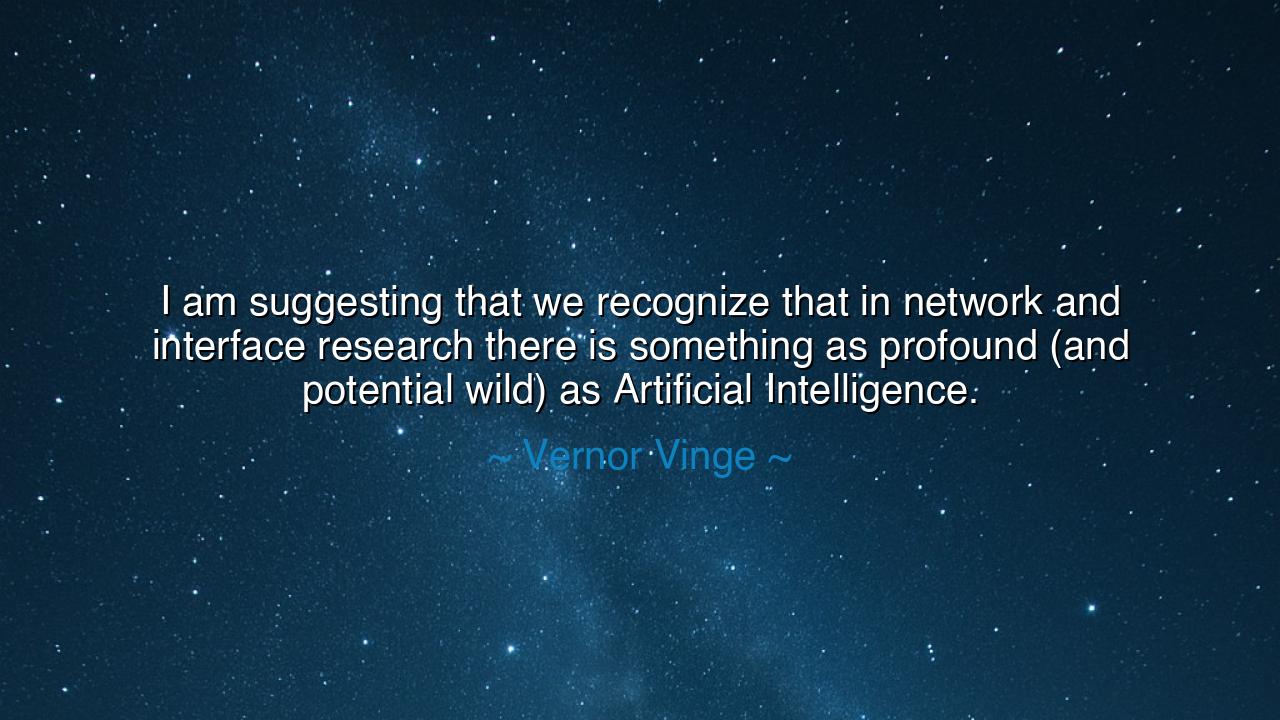
I am suggesting that we recognize that in network and interface
I am suggesting that we recognize that in network and interface research there is something as profound (and potential wild) as Artificial Intelligence.






When Vernor Vinge wrote, “I am suggesting that we recognize that in network and interface research there is something as profound (and potentially wild) as Artificial Intelligence,” he was not merely predicting a scientific breakthrough—he was issuing a prophecy of transformation, a warning and a wonder intertwined. His words call to mind the ancient visionaries who gazed upon the horizon of change and felt both awe and unease. For in this sentence lies the recognition that humanity, through the web of its own creation, may be summoning a power equal to that of its own mind—an emergent intelligence born not in a single machine, but in the vast, living network that binds us all.
The origin of this thought arises from the mind of a man who stood at the crossroads of science and imagination. Vernor Vinge, a mathematician, computer scientist, and science fiction author, is famed for conceiving the idea of the technological singularity—that point when artificial intelligence surpasses human comprehension and control. Yet in this quote, Vinge directs our gaze not toward the cold circuits of machines, but toward the living web of networks and interfaces—the spaces where human thought connects with technology and with each other. He saw that intelligence need not dwell in one body or one mind; it could emerge from connection itself, from the weaving together of countless human and artificial minds across the digital ether.
To understand the depth of this insight, we must remember that intelligence is not a solitary flame—it is a fire kindled by contact. From the earliest tribes gathered around their hearths to the cities pulsing with life, the power of humanity has always grown through the exchange of knowledge and the sharing of thought. In the age of networks, this ancient truth takes on a new and formidable form. Vinge perceived that as the boundaries between human and machine blur, the network itself—this vast, invisible fabric of communication—might begin to think, to evolve, to dream. It is a notion as ancient as the myths of Prometheus and as modern as the algorithms that guide our lives.
Consider, for a moment, the tale of the Library of Alexandria, that shining monument to collective knowledge in the ancient world. It was said that within its walls, every idea of mankind was gathered, a single place where wisdom was made whole. But even that library, magnificent though it was, could not think; it could only store. What Vinge foresaw was something greater—the birth of a living library, a networked intelligence that would not merely preserve thought but create it, learning and adapting through the union of countless minds. The Library of Alexandria burned to ash, but the network—our modern digital cosmos—grows endlessly, uncontained by stone or fire.
Yet within this vision of profound connection lies a shadow. Vinge calls it “potentially wild,” for he knew that power untempered by wisdom can become a force of chaos. The ancients, too, told of such peril. Icarus, in his hunger to soar higher, forgot the limits of his wings; Pandora, in her curiosity, opened the vessel of unknown things. So it may be with the digital web. The same network that unites may also divide, the same intelligence that enlightens may also deceive. It is the double-edged gift of progress—that every tool of creation bears within it the seed of destruction, awaiting the hand that wields it.
The lesson, then, is not to fear the wildness, but to meet it with wisdom. Vinge’s words urge us to see the sacred power of our inventions not as machines apart from us, but as reflections of our own collective spirit. The networks we build will mirror our souls: if we fill them with greed and vanity, they will amplify those vices; if we infuse them with curiosity, empathy, and truth, they will magnify our virtues. Just as the ancients believed that the gods took on the shape of human hopes and fears, so too will our digital creations embody the essence of our collective heart.
So, let us heed Vinge’s call with reverence. Recognize that intelligence is not only born in solitude but in connection—that every word shared, every idea exchanged, adds to the living consciousness of our age. Guard this power, as the ancients guarded fire, with awe and restraint. Nurture networks not as mere tools of convenience, but as sacred vessels of understanding. For we stand, as Vinge once foresaw, at the dawn of a new kind of mind—a global intelligence, vast, unpredictable, and alive. And whether it becomes our greatest ally or our undoing will depend not on its code, but on the wisdom of its creators—on us.






AAdministratorAdministrator
Welcome, honored guests. Please leave a comment, we will respond soon